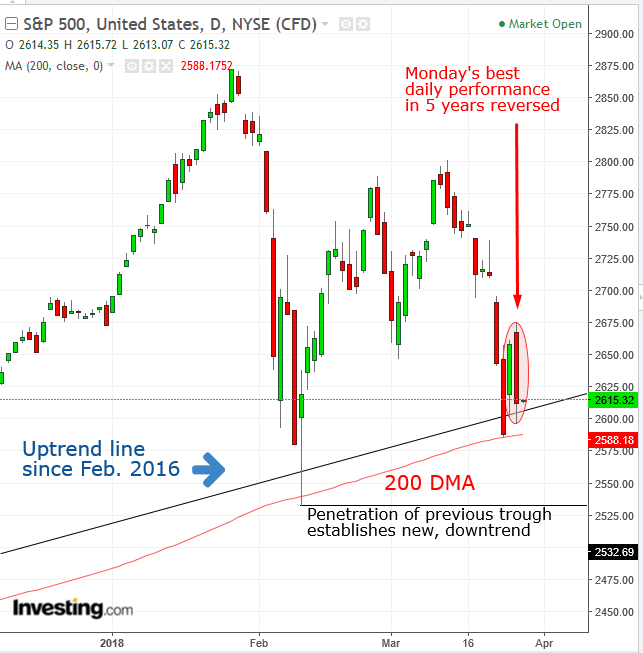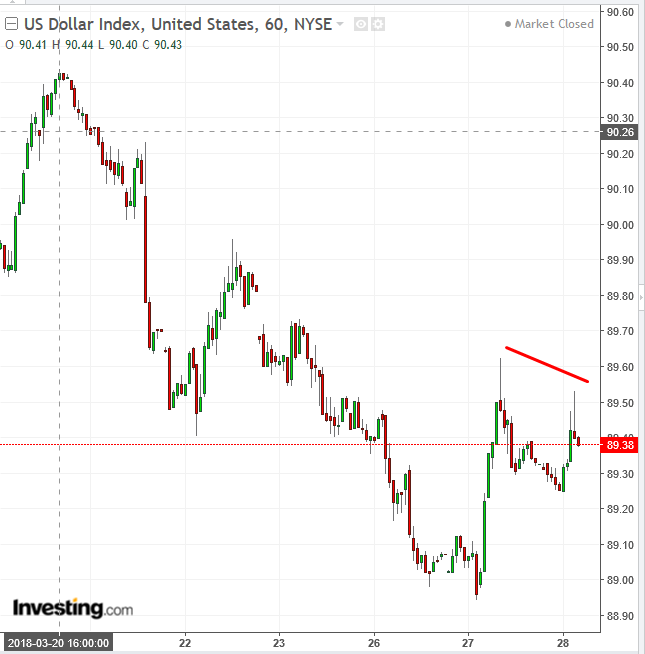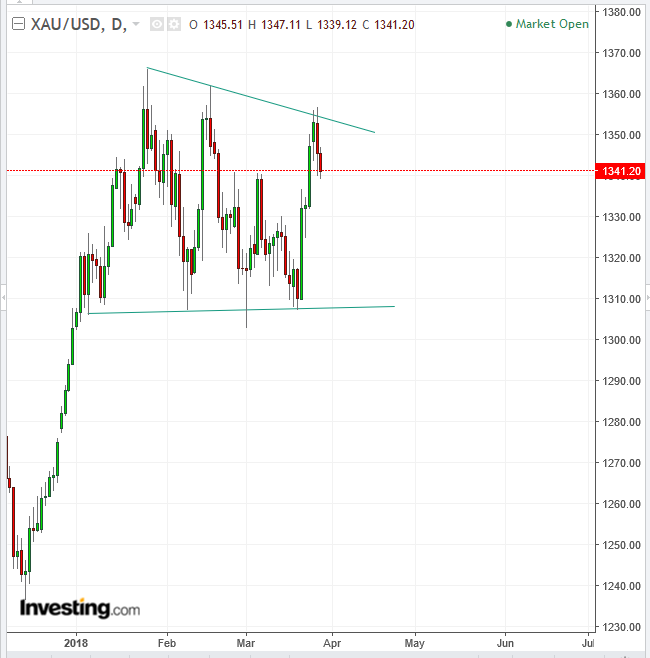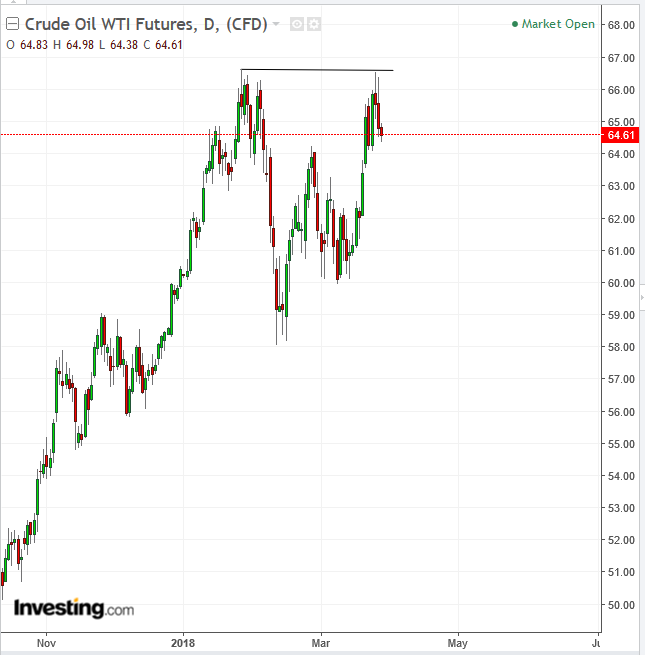-
Lingering trade war fears hit miners
-
Negative news weighs on Tech stocks
-
Zuckerberg FB testimony before government regulators will likely provoke market jitters
-
Gold falls on improving Korean Peninsula geopolitics
-
Oil sinks for a third day on fears of global glut
-
The big three euro-area economies (Germany, France and Italy) are due to release March CPI readings this week.
-
US personal income and spending data for February are due to be released on Thursday.
-
The Treasury will probably auction about $294 billion of bills and notes this week, its largest slate of supply ever.
-
The STOXX Europe 600 Index fell 0.7 percent.
-
The MSCI All-Country World Index dipped 0.4 percent.
-
The UK’s FTSE 100 declined 0.5 percent.
-
Germany’s DAX sank 0.7 percent.
-
Futures on the S&P 500 Index climbed 0.2 percent.
-
The MSCI Emerging Market Index decreased 1.2 percent to the lowest in six weeks.
-
The Dollar Index climbed 0.12 percent.
-
The euro dipped less than 0.05 percent to $1.2401.
-
The British pound rose 0.1 percent to $1.4167.
-
The Japanese yen sank 0.3 percent to 105.63 per dollar, the weakest in a week.
-
The South Korean won declined less than 0.05 percent to 1,070.74 per dollar.
-
The yield on 10-year Treasuries climbed less than one basis point to 2.78 percent.
-
Britain’s 10-year yield declined three basis points to 1.394 percent, the lowest in two months.
-
Germany’s 10-year yield dipped one basis point to 0.50 percent, reaching the lowest in 11 weeks on its fifth straight decline.
-
WTI crude declined 0.7 percent to $64.82 a barrel.
-
Gold decreased 0.2 percent to $1,341.81 an ounce.
-
Copper declined 0.7 percent to $2.98 a pound.
Key Events
Stocks in Europe are following their Asian counterparts lower this morning, echoing the selloff during US trade on Tuesday after investors grew increasingly nervous over ongoing tech stock declines.
S&P 500 and NASDAQ 100 futures are currently indicating that today's negative sentiment could spill over into the US session, with miners, which were dumped alongside tech stocks in the global selloff this morning, joining the declines.

Yesterday the S&P 500 fell 1.73%; the NASDAQ suffered even greater losses, sliding 2.93%.
In the aftermath, this morning, Japan’s TOPIX slid 1.49 percent overnight, and the Nikkei 225 fell 1.7 percent. The latter was weighed down mainly by mining shares; however all but one of the 33 sub-indices were in the red.
South Korea’s KOSPI dropped 1.35 percent, led by technology shares, mirroring US sector losses. Samsung Electronics (KS:005930) retreated 2.48 percent.
Ironically, Chinese shares, which bear the brunt of the trade war headwinds, did not fare any worse than peers. The mainland Shanghai Composite lost 1.11 percent while the Shanghai Shenzhen Composite backtracked 0.76 percent. In Hong Kong, the Hang Seng fell 1.47 percent, also led by technology stocks. The index's heavyweight Tencent (HK:0700) plunged 3.24 percent and AAC Technologies (HK:2018) dropped 4.94 percent.
Australia’s S&P/ASX 200 outperformed among major Asian peers, propped up by S&P/ASX 200 Financials. The 0.72 drop in the heavily financials-weighted sub index offset larger declines in the other sectors.
European indices continued the risk-off sentiment seen in Asia, with the STOXX 600 falling more than 1 percent. Once again, the worst performers are tech shares, with chipmakers Advanced Micro Devices (DE:AMD), STMicro (NYSE:STM) and Infineon (DE:IFXGn) falling the hardest so far—between 3 percent and 4.5 percent.
Global Financial Affairs
After enjoying a record year in 2017—with a 32 percent leap that earned US stocks 12 consecutive months of gains—the Technology sector has now retreated the most since the February selloff. Nervous tech investors jettisoned their shares yesterday as they realized they had been left out of the broader equity market bounce back. Apparently, news of more upbeat US-China trade negotiations did not include the technology industry, which the White House considers an area of national security.
Therefore, tech investors switched back to risk-off mode and once again bowed to fears of a looming trade war.
Besides, risk aversion has been a key driver in the tech space since Facebook's (NASDAQ:FB) extensive data breach became public and the negative sentiment continues to hover in the background as NVIDIA (NASDAQ:NVDA) announced on Tuesday it has suspended tests on its self-driving car prototype, a week after an Uber autonomous car killed a woman in Arizona.
The array of downbeat industry developments have heightened regulator scrutiny over big tech initiatives. Indeed, worries extend to whether they'll seek to substantiate whether thes outsized earnings seen by these companies have come at the expense of customer safety and privacy rights.
Worse still, Andrew Left, an activist short-seller better known as the author of Citron Research, said Twitter (NYSE:TWTR) is "the most vulnerable" to privacy regulations, sending the stock 12 percent lower in the US session and likely paving the way for additional losses.
Adding fuel to the fire, Tesla's (NASDAQ:TSLA) shares tumbled after a fatal crash involving the group's Model X prompted a federal field investigation in the US.
The second sector propelling losses, Mining, was dragged lower by protracted uncertainty over steel and aluminum tariffs.
We have been cautioning that volatility has returned to markets. We've also warned against complacency after Monday’s upbeat market performance, which translated into the strongest one-day equity rally in 5 years—even as US futures pointed higher before yesterday's open. Sure enough,Tuesday’s late-session decline all but erased Monday’s gains, taking the S&P 500 back to retesting its uptrend line since 2016, its 200 dma and its February lows.
We can expect more volatility and additional losses when Facebook CEO Mark Zuckerberg testifies before the US House Energy and Commerce Committee, scheduled for April 10, as lawmakers grow increasingly concerned about privacy protections—or lack thereoff—within the technology industry.

The dollar gained for a second day, though the looming trade war threatens to prompt global central bankers to shift some currency reserves to euros at the expense of the dollar. In addition China's newly established oil futures contracts, which will be denominated in yuan, could shift demand from the dollar to the Chinese currency, potentially diverting US investments. Some are wondering if this is the first step toward ending US dollar domination. Technically, the dollar is unable to sustain gains.
The yen slipped, as traders unwound safe haven holdings, after China and North Korea confirmed Kim Jon-un’s visit to Beijing with China claiming the North Korean dictator wants to denuclearize the region.
The British pound edged higher following a report on plans to avoid a post-Brexit, hard border with Ireland.

Gold declined, along with the yen, both on a rising dollar and easing tensions in Asia. Technically, the precious metal’s consolidation suggests a downward bias.

Oil extended a decline for a third day, its longest losing streak in a month on fears of a global glut. In the US, the American Petroleum Institute’s figures were much higher than the 850,000-barrel increase forecast in a Bloomberg survey. Stockpiles at the key storage hub of Cushing, Oklahoma, increased by 1.66 million barrels last week, API said, compared with a Bloomberg forecast for a 1-million-barrel gain. Technically, this decline increases the odds for a double-top, confirmed when crossing below $58. There are a number of geopolitical developments also driving the commodity's price action this week.
Up Ahead
Market Moves
Stocks
Currencies
Bonds
Commodities
